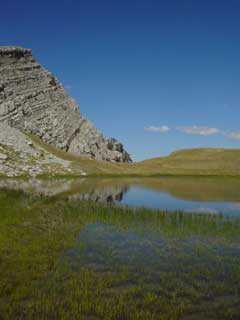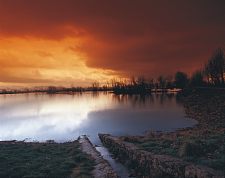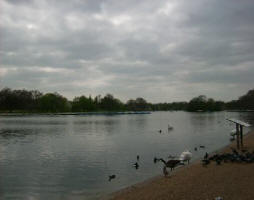 River Jordan to fall dry next year - will it be cooperation or riparian suicide ?
River Jordan to fall dry next year - will it be cooperation or riparian suicide ?
The last week a flurry of international media attention has gone around the world about the stark warning that the River Jordan is expected to fall dry next year. Friends of the Earth Middle East (FOEME) issued this stark warning during a conference in Amman, Jordan to try to find solutions for saving the River Jordan. FOEME's warning is timely at the moment that proximity talks have started between Palestine and Israel. The policy makers should become much more aware of the central role of water in achieving regional peace. Right now the question is, will it be cooperation or riparian suicide ?
The competition for water may be grounds for full-scale war and conflict in the short term. In the long-term, the outcome of war over water is detrimental for all parties involved. In terms of a shared ecology and ecosystems approach, the only way forward is to find a sustainable solution to water scarcity-a process that must involve cooperation and coordination between communities. The population of the region is growing but the water supply is not increasing. Another option, the desalination of seawater, if even a viable option, can cause environmental damage by introducing large amounts of water into a fragile ecosystem and may not be a sustainable solution.
According to Clemens Messer-Schmid's , a German expert working in Palestine "As a hydro-geologist, desalination here, and everywhere else in the world, is a great absurdity: it's crazy to use nonrenewable resources that were created millions of years ago in order to manufacture the most mobile element in the universe-water."
The proposed mega project to build a Red-Dead Sea canal poses still many environmental questions and being located in the lower River Jordan basin will not save the River Jordan.
Therefore the countries must find alternative solutions. Solving the problem lies mainly in managing demand. Most of the water that is taken out of the Jordan River comes from the demand from irrigated agriculture, which should be heavily reduced or even nullified. This would mean a major shift from subsistence agriculture to a more diversified economy. Today most of the economies of Middle Eastern countries like Egypt and Syria are based largely on agriculture.
Tony Allan of King's College London, drawing on virtual water theory, believes that moving away from agriculture is the only way for Middle Eastern countries to solve their water scarcity and distribution problems. Water currently used in food production could help be used towards restoring the water balance in the region. For this to occur, Middle Eastern nations need to diversify their economies and import more food, growing less of their own wheat thereby utilizing less water resources on agricultural production. "The major driving force that will lead to the transformation and reform of water policy and management in the region is progressive socio-economic development." This option is not feasible any time soon as the largely agricultural lifestyle continues to heavily influence Middle Eastern political bodies.
So what is the best solution to do something right now to save the river Jordan from extinction ? The solution is quite simple. Cooperation between the riparians and fair distribution of water resources; in other words the riparians should just get their act together. They do not need to love each other to cooperate. But peace will help. Is this wishful thinking? Maybe. But pessimism and sarcasm never helps. What if the choice is between lose-lose of win-win? Water is the source of life and right now most of the riparians are in fact depleting their very own source of life. So you can call it a sort of "riparian suicide". When the riparian countries keep on doing what they are doing with the River Jordan, the whole region is at risk to be sliding into an abyss of conflict that nobody really wants.
The international standards to form and develop a framework for riparian countries to share river basins are there. It only needs courage and a "peace of the braves" to come to an environmental solution which will save the lives of many future generations in the region.
It remains to be seen whether the message that the environmental community is sending out will fall on deaf ears of the policy makers. Right now, the newly started proximity talks will also have water and cooperation on the agenda. The appointment of Dr. Shaddad Al Atilli as Palestinian Minister of Water (or "Virtual Water" as he calls himself) is a great step in the right direction of being able to put the regional water situation in perspective and hopefully coming to a fair agreement. Let's hope that his Israeli counterparts will agree with him and realise that indeed water is the only topic where there could be a real win-win situation. It is in Israeli's own interest to cooperate and treat the Palestinians as equal partners and neighbours rather then maintaining this never ending master-slave relation, otherwise they are shooting themselves in their feet. But if in the end, the Palestinian and Israelis manage to come to a fair agreement on water, this could set an example for the region on how water in the Middle East can actually lead to peace and not war.
At international level, the management of the Jordan river basin has been discussed since many years between riparians, in public fora, informally at scientific conference and backstage. It is time for politicians and policy makers to strongly listen to these efforts. The solution is there. It only needs courage and peace. The other route is unfortunately darkness, conflict and war.
| Contact information |
Joshka Wessels
(email: joshka@sapiensproductions.com) |
|---|---|
| News type | Inbrief |
| File link |
http://www.fromthesourcemiddleeast.blogspot.com/ |
| Source of information | From the Source |
| Keyword(s) | Peace, riparians, River Jordan, War |
| Subject(s) | AGRICULTURE , DRINKING WATER , FINANCE-ECONOMY , HYDRAULICS - HYDROLOGY , NATURAL MEDIUM , POLICY-WATER POLICY AND WATER MANAGEMENT , RISKS AND CLIMATOLOGY , WATER DEMAND |
| Geographical coverage | Jordan, Israel, Palestine, Lebanon, Syria |
| News date | 11/05/2010 |
| Working language(s) | ENGLISH |
 you are not logged in
you are not logged in





